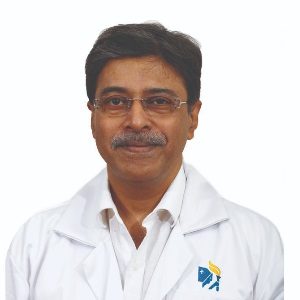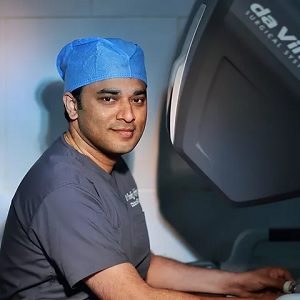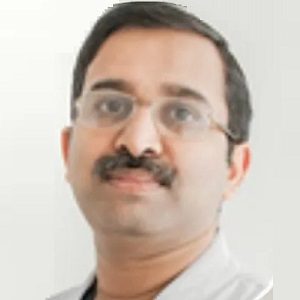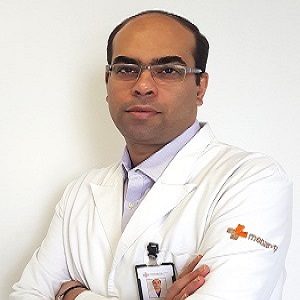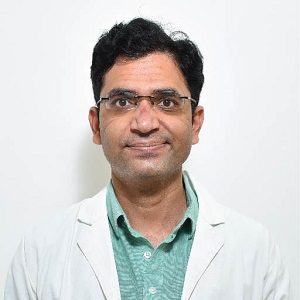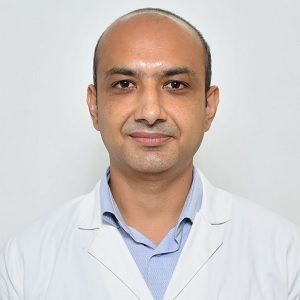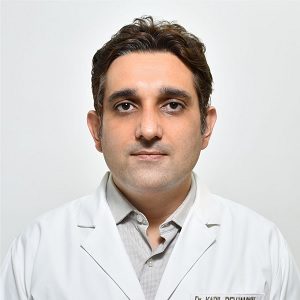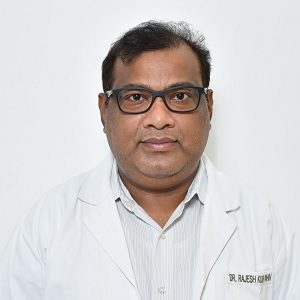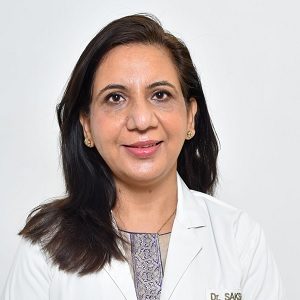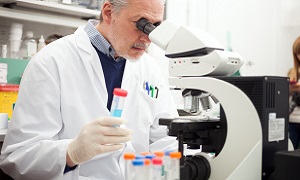Best Doctors in India for Lynch Syndrome Treatment
- Liver Transplant Surgeon and HPB Surgeon, Chennai, India
- Over 15 years’ experience
Profile Highlights:
- Dr. Selvakumar Naganathan is one of the best liver transplant surgeons in India with nearly 15 years of experience.
- He has carried out more than 2000 procedures, including 300 donor & 500 recipient hepatectomies, cadaver transplantations, retrieval of cadaver livers, and live donor liver transplants.
- He also established many liver transplantation centers across India & other countries.
- General Surgeon and Surgical Gastroenterologist, Chennai, India
- Over 27 years’ experience
Profile Highlights:
- Dr. Raghunath K J is a well-known name in the field of general surgery with an experience of more than 27 years.
- He went under training in advanced Laparoscopic surgery from Canada and France.
- Dr. Raghunath pioneers many prestigious projects in the UK.
- Dr. Raghunath has a specialized interest in Gall Bladder Stone treatment, Hernia, GI Cancer Surgery, Laparoscopic Sleeve Resection, Endoscopic Surgery, etc.
- Colorectal Surgeon and Robotic Surgeon, Chennai, India
- Over 26 years’ experience
Profile Highlights:
- Dr. Venkatesh Munikrishnan is one of the best Gastroenterologists and Colorectal Surgeons in Chennai, having 21 years of experience in managing disorders that need surgical treatment.
- Dr. Munikrishnan specializes in surgical oncology, endoscopy, Gastritis Treatment, etc.
- He is also active in research; one of his research on CT Colonography fetched a grant from Bracco, Milan, Italy.
- GI Surgeon and Liver Transplant Surgeon, Gurugram, India
- Over 20 years’ experience
Profile Highlights:
- Dr. Amit Nath Rastogi is a pioneer in the field of liver transplant surgery. He completed his fellowship in liver transplant surgery at Sir Gangaram hospital while being a part of the largest liver transplant program in the country.
- Furthermore, he received his training in robotic liver surgery from IRCAD -Strasbourg, France, and advanced robotic HPB training from Grosseto.
- Liver Transplant Surgeon, Gurugram, India
- Over 10 years’ experience
Profile Highlights:
- Dr. Prashant Vilas Bhangui is one of the highly trained liver transplant specialists who received his training in Surgical Gastroenterology and Liver Transplantation.
- He also holds a European Inter-University Diploma in Hepato-Biliary-Pancreatic Cancers.
- Dr. Prashant is further interested to work in certain fields which include hepatocellular carcinoma, colorectal liver metastases, and living donor liver transplantation. Besides this, he has also published several journals on these subjects.
- Gastroenterologist, Gurugram, India
- Over 7 years’ experience
Profile Highlights:
- Dr. Abhinandan Mishra is one of the young Gastroenterology doctors in Gurugram who is particularly interested in inflammatory bowel disease treatment.
- Dr. Abhinandan Mishra offers Endoscopic Retrograde Cholangiopancreatography, Ascites tap, Endoscopy, Peroral Endoscopic Myotomy, Capsule Endoscopy, Esophageal Manometry, Magnetic Resonance Cholangiopancreatography, etc.
- Gastroenterologist, Gurugram, India
- Over 18 years’ experience
Profile Highlights:
- Dr. Atul Sharma is a renowned Gastroenterology practitioner in Gurugram and is particularly interested in Third Space Endoscopy and Per Oral Endoscopic Myotomy (POEM).
- He presented several papers on Manometry, Luminal gastroenterology, and interventional Gastroenterology during training in Advanced Interventional GI Endoscopy.
- Gastroenterologist, Gurugram, India
- Over 15 years’ experience
Profile Highlights:
- Dr. Kapil Jamwal is a renowned GI practitioner in Gurugram with an extensive experience in digestive and liver disease.
- The specialist offers treatment for Hepatitis B, Jaundice, Hepatitis C, Inflammatory Bowel Syndrome, Acute Pancreatitis, Liver Diseases, and Irritable Bowel Syndrome.
- Gastroenterologist, Gurugram, India
- Over 18 years’ experience
Profile Highlights:
- Dr. Rajesh Padhan is a renowned Gastroenterologist in Gurugram with an extensive experience of more than 18 years in the field.
- He is skilled in carrying out various endoscopy procedures such as Colonoscopy, Endoscopic retrograde cholangiopancreatography, Endoscopic ultrasound, upper GI endoscopy, etc.
- Gastroenterologist, Hepatologist, Gurugram, India
- Over 25 years’ experience
Profile Highlights:
- Dr. Sakshi Karkra is one of the best Pediatric gastroenterologists in Gurugram.
- She has special interest/ expertise in Colonoscopy, Upper GI Endoscopy, Capsule endoscopy, Enteroscopy, Endoscopic variceal ligation, Foreign body removal, Stricture & achalasia dilatation, Polypectomy, Anal manometry, Liver Biopsy, and Colonic manometry.
Best Hospitals in India for Lynch Syndrome Treatment
Lynch Syndrome
Lynch Syndrome is an inherited condition that can increase a person’s risk of developing certain cancers such as colorectal cancer, before the age of fifty. It may also be referred to as nonpolyposis colorectal cancer.
People having Lynch syndrome can have a lifetime risk of having colorectal cancer, endometrial cancer, ovarian cancer as well as stomach cancer. Lynch syndrome can also make cancer more likely in parts such as the skin, brain, kidney, liver, gallbladder, small intestine as well as urinary tract.
Lynch syndrome is known to be the most common inherited cancer syndrome and affects as many as 1 in every 370 people in Western nations.
Symptoms
People having Lynch syndrome may develop noncancerous growths in the colon. These benign growths are also known as polyps. However, it is to be noted a number of colon polyps that develop are not affected by Lynch syndrome.
Some other symptoms and complications that lynch syndrome can lead to, include the following:
- Stomach pain
- Bleeding inside the gut
- Constipation
- Fatigue
- Unintentional weight loss
- Glioblastoma, an aggressive type of brain tumor
- Reduced ability to absorb nutrients from foods
Causes
Lynch syndrome is known to run in families in an autosomal dominant inheritance pattern. Therefore, it means that if one parent carries a gene mutation for Lynch syndrome, a fifty percent chance is there that mutation will be passed on to each child. The risk of this syndrome is the same whether the father or the mother is a gene mutation carrier or whether the child is a son or daughter.
The genes which are affected in Lynch syndrome are responsible for correcting the changes in the genetic code.
Your genes contain DNA, which is responsible for carrying instructions for every chemical process in your body. As your cells continue to grow and divide, they make copies of their DNA and in some cases, there might be few minor mistakes.
Although normal cells have certain mechanisms that help them to identify mistakes as well as to repair them, the cells of people inheriting one of the abnormal genes which are associated with Lynch syndrome, lack this ability to repair these kinds of mistakes. Genetic damage is caused when there is an accumulation of these mistakes, and eventually, this can cause the cells to become cancerous.
Diagnosis
A doctor can determine whether you have a genetic mutation that is associated with Lynch syndrome by analyzing your DNA. Before genetic testing, a doctor might review your personal and family medical history to determine how likely you are to have Lynch syndrome.
People who are having Lynch syndrome can choose to learn more about the condition by seeing a genetic counselor.
Treatment
Treatment for this condition can vary, depending on whether a person is showing signs of colorectal cancer or not.
People who are having cancer, but have not developed cancer might want to schedule regular colonoscopies and cancer screenings.
During a colonoscopy, a doctor is going to examine the colon and rectum for signs of abnormal cell growth. It is also often possible to remove colon polyps during this procedure.
Some people can choose to undergo a prophylactic colectomy, which involves removing the colon before colon cancer develops.
For people having Lynch syndrome and also having colorectal cancer, the following treatments are generally available:
Polypectomy
Colectomy
Ablation
Cryosurgery
Embolization
Complications
Other than causing complications for your health, a genetic disorder like Lynch syndrome can also raise several concerns. Some other aspects of your life which might be affected include the following:
Your privacy – The results of your genetic test will be listed in your medical record, which insurance companies and employers will be able to assess.
Your children – If you have Lynch syndrome, your child or children have a risk of inheriting your genetic mutations as well. If one parent carries a genetic mutation for Lynch syndrome, there ‘is a fifty percent chance of each child inheriting that mutation. A genetic counselor may help you to develop a plan in order to discuss this with your children. This includes how and when to tell them and when they should consider going for testing.
Your extended family – A Lynch syndrome diagnosis can have implications on your entire family since there is a chance that Lynch syndrome is present in many other blood relatives as well. A genetic counselor can help you to find the best way to tell your family members that you’re going to have genetic testing and what that the results mean.
Prevention
There is no way to prevent colorectal cancer completely, but people are able to lower their risk by getting colorectal cancer screenings.
Obesity has been linked to several different cancers, which include the following:
- Colorectal
- Esophageal
- Liver
- Kidney
- Ovarian
- Breast
- Gallbladder
- Stomach


